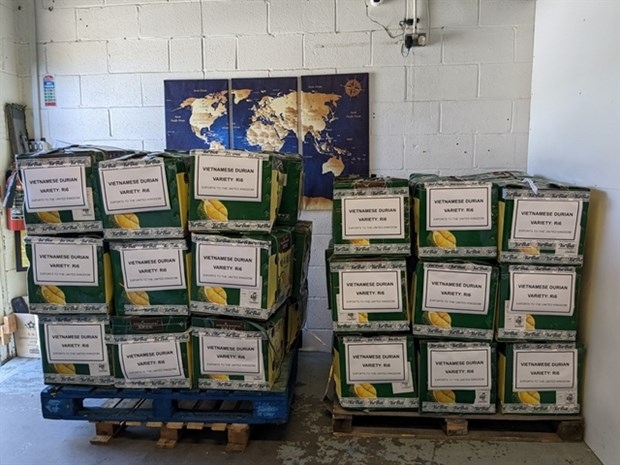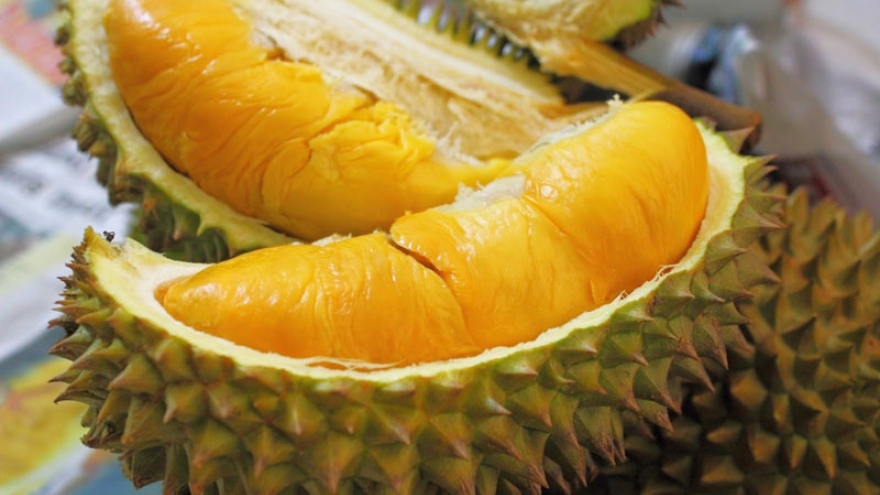UK is potential market for Vietnamese durian
Vietnamese durian exports to the UK have increased due to high demand for this fruit and the advantages of the UK-Vietnam Free Trade Agreement (UKVFTA).

Since the first batch of Vietnam’s Ri6 durian was officially exported to the UK in May, TT Meridian Company has regularly imported 3-4 tonnes of this speciality fruit every week, demonstrating the high demand for this fruit in the UK market.
Having spent many years researching Vietnam's fruits with export potential to the UK market, TT Meridian, a company specialising in the distribution of Vietnamese agricultural products in the UK, sees bright export prospects for Vietnamese durian in this market.
Thai Tran, Managing Director of TT Meridian, stated that with the preferential tax of zero under the UKVFTA, Vietnamese durian imported into the UK has a competitive price advantage compared to durian products from other countries, which are subject to an 8% tax rate. This is especially significant in a context where high inflation makes price a top concern for importers, distributors, and consumers in the UK.
According to him, the UK market comprises many customer segments, and Vietnamese durian can target Asian customers as well as manufacturers and processors of durian products like ice cream, yoghurt, and smoothies. The advantage in price also provides an opportunity for this type of Vietnamese fruit to reach UK consumers and distributors.
However, he also highlighted several challenges for Vietnamese durian in gaining market share in this competitive market.
One challenge for durian exporters is the procedure to obtain a certificate of origin from the Vietnamese authorities for durians exported to the UK. To benefit from tax incentives under the UKVFTA, businesses currently face a time-consuming and costly process as they have to directly apply for a paper certificate of origin. As a solution, he proposed the introduction of electronic certificates with online transactions.
Echoing this sentiment, Vietnamese Trade Counsellor in the UK Nguyen Canh Cuong suggested state management agencies assist businesses by reducing the total time required for quarantine, issuance of the certificate of origin, and customs clearance to half a day, allowing products to be loaded onto flights the same day.
Another challenge for durian importers is ensuring consistent product quality. Thai Tran noted that a lack of quality consistency in durian imported into the UK could hamper the establishment of trust, a vital element in forging long-term partnerships with distributors, wholesalers, and retailers in the UK.
He emphasised that Vietnam's durian producers and exporters must adopt scientific production methods and preservation technologies to guarantee product quality consistency if they hope to boost exports to this market.
Thai Tran further pointed out that high costs related to transportation, logistics, and the intermediary stage also pose challenges. The freight charge for transporting Vietnamese durian to the UK, making up a significant portion of the product price, is 1 USD per kilo more than that of durians from countries like China, Malaysia, or Thailand.
Furthermore, the logistics and intermediary costs are substantially high, driving up the selling price of Vietnamese durian to consumers even when the purchase price at source is competitive.
He advised that Vietnamese businesses should strive to reduce intermediary costs and collaborate with major logistics partners to decrease expenses and enhance competitiveness.
Exporters also need to minimise operating costs and emphasise productivity and efficiency by implementing advanced production and management methods, as well as adhering to quality standards like HACCP and ISO.
Additionally, Thai Tran advised durian producers and exporters to diversify their export markets rather than relying solely on one. While markets such as the US, Europe, UK, and Japan currently import modest amounts of Vietnamese durian, they officially recognise and fetch good prices for the fruit.
As such, these markets hold potential and should not be overlooked in favour of concentrating exclusively on China – a major export destination for Vietnam, which offers convenient transportation logistics.
Thai Tran believed that given the current competitive edge in pricing, Vietnamese durian can assuredly retain a consistent market share in the UK, provided authorities and businesses collaboratively address the challenges inherent to exporting this high-value speciality fruit.
He further emphasises the need for exporters to invest in the development of national brands for Vietnamese products, especially fruits.
Moreover, Vietnam should ramp up the promotion of its signature fruit varieties, such as lychee and durian, utilising platforms like social media, websites, newspapers, and advertisements during key sporting events, and trade exhibitions.
Starting this year, Thai Tran noted that TT Meridian has incorporated the image of the national flag on the packaging of Vietnamese products distributed in the UK. This strategy is intended to bolster the Vietnamese brand, enabling consumers to effortlessly recognise and select Vietnamese products on supermarket shelves in the UK.



